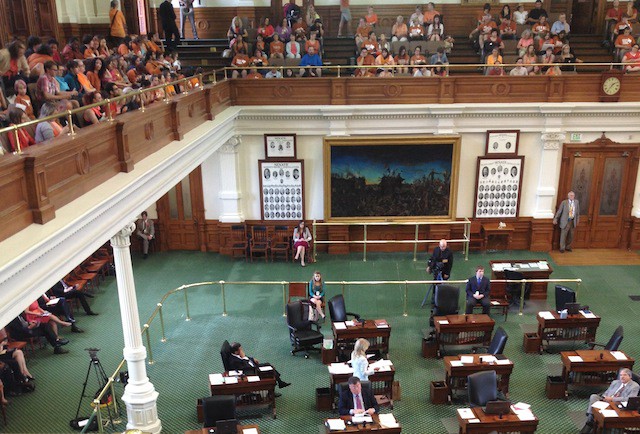Wendy Davis’s Texas
by Susan Elizabeth Shepard

On June 25, Texas state senator Wendy Davis (D-Fort Worth), filibustered against Senate Bill 5, a piece of extremely restrictive legislation designed to shut down nearly all of the abortion clinics in Texas and greatly increase the difficulty of obtaining a safe and legal abortion in the state. I was prompted to attend by Erica Grieder, a staffer at Texas Monthly (a magazine that also employs my husband), who’d predicted “a not-appalling day in politics.”
A not-appalling day in the Texas Legislature? Sign me up to see history happen. I often point the Capitol out to visitors and call it a “bad idea factory,” but it’s a beautiful pink granite building on rolling green grounds, a perfect centerpiece for Austin. It’s one of the reasons, along with Slacker and Ann Richards, that I felt really good about being a Texan when I was a teenage girl. Of course, when I turned 18, in 1994, George H.W. Bush defeated Richards and the rest is literal history.

Reproductive rights are important to me for reasons I can’t imagine need to be explained to Hairpin readers, but they were important to my grandmother Charlotte because when she was a girl, she found her family’s housekeeper bleeding out in her bedroom after trying to self-abort. Abortion access remained her cause past death and I knew Charlotte wouldn’t have missed seeing Davis’ filibuster for the world, so I put a pair of her enormous glasses frames — one of her style signatures — in my purse before leaving for the Capitol that night. I had no idea that by midnight, everyone in my Twitter feed would be intensely focused on the fate of SB5 and talking, reverently, about Wendy Davis.
I was able to sit in the Senate gallery the first two times I went in, around 1 p.m. and around 5:30 p.m., but after that, the lines to get in stretched in repeating circles around the Capitol dome. At no point was the Senate gallery crowded. There were always empty seats. Standing isn’t allowed there, presumably in an effort to prevent an unruly mob from disrupting the proceedings. Davis started to deal with interruptions both helpful and not. Robert Nichols raised points of order and Kirk Watson asked leading questions. Davis was given two parliamentary warnings for raising a topic, Planned Parenthood’s budget, that wasn’t germane, and for being assisted with putting on a back brace. I asked Grieder for her perspective from the floor at that time and she wrote:
Personally, I felt like the stakes changed after that. Davis couldn’t stop the bill; at best she could delay it. Nonetheless, she was giving a filibuster that necessarily required more physical and mental stamina than any of her opponents had ever been asked to display on the floor of the Texas Senate, with hundreds of thousands of people watching her — and more to the point, with about twenty Republicans, all of them supposedly her colleagues, half of them men twice her size, hovering around waiting to pounce on the slightest misstep.
I’d gone home for a while and was watching the Texas Tribune’s livestream until around 10:30, when the Republicans were trying to make a third warning stick — this time contending that discussion of the 2011 legislation mandating pre-abortion sonograms wasn’t germane — and the galley broke out into boos. For the third time I went back to the Capitol, this time going to Planned Parenthood’s staging room, to watch on closed circuit again. That and tweets from inside the chamber were the only way to know what was going on. As it got closer to midnight, I heard one woman say “If we’re loud enough, we can run out the clock. They can’t arrest all of us in 13 minutes!”
Leticia Van de Putte’s measured exasperation was what finally propelled the crowd to a sustained roar after she said “Did the President [of the Senate, Texas lieutenant governor David Dewhurst] hear me or did the President hear me and refuse to recognize me? At what point must a female senator raise her hand or her voice to be recognized over her male colleagues?” From Grieder, again:

From my perspective Senator Van de Putte’s outburst, at about a quarter til midnight, was spontaneous and sincerely felt. (Her dad had died a few days earlier in a car accident; she had literally been at his memorial earlier that day….so I doubt she had the presence of mind to grandstand). I also felt that it was spontaneous when people in the gallery started shouting — I actually couldn’t tell for sure, because I wasn’t in the gallery, but Van de Putte’s question hadn’t been planned (it actually couldn’t have been planned, the way it came up) and at that point everyone in the room, the Republicans, the Democrats, the staffers, the people in the gallery, the journalists, everyone was just super wound up.
People started running upstairs into the rotunda and soon it was filled with noise. We still relied on Twitter to tell us what was happening. Midnight came and went. “What’s going on? Do we even know?” I asked a friend. No. Not only did we not know, the Senate itself didn’t know if they had successfully voted.
They hadn’t. For a short while, Senate Republicans displayed a record of voting that supported their contention they’d voted before midnight, but it turned out to be falsified. They had failed to pass the bill by their midnight deadline, but the victory was symbolic and brief. The legislation passed during the next special session.
But this fall, Davis announced her candidacy for governor and Van de Putte announced hers for lieutenant governor. Davis would be the first Democratic governor in 20 years, and she has a few similarities with Richards. Both campaigned as unmarried, divorced women (Davis is in a relationship with former Austin mayor Will Wynn, who would make a fine piece of arm candy for a governor). Both were smeared by Republican men (Richards was rumored to be a cocaine addict and closeted lesbian, Rick Perry said Davis was lucky her mother didn’t abort her). Both had signature style features (Richards’ hair, Davis’ Mizunos).
Davis, like Richards at the 1988 Democratic National Convention, gave the other Texas an opportunity to show itself to the country. Texas rightfully deserves to take the rap for executing the innocent and the developmentally disabled, for Ted Cruz, Rick Perry and George W. Bush. But for the millions of people here who vote otherwise or work to correct the wrongs, knowing the coasts think we’re idiot hicks or if we’re not, that we should move, stings. We either have to say, “It’s not all like that” or nod and say, “Yep, sure does suck. But now we have another reference point. Because, you see, Texas also produces people like Wendy Davis, and the thousands of supporters who filled the Capitol in June.
One of the things people can say to prove their ignorance of Texas is, “Oh, Austin! It’s like a little oasis in Texas, isn’t it? Not really like the rest of it.” That is wrong. There is no Austin without the rest of Texas. It might, today, draw people from all over the country, but the people who gave it that draw were the ones from all over Texas in the first place. There is a Texas that produced Ann Richards, Molly Ivins, and Barbara Jordan, and, like them, Austin isn’t an exception. It’s a distillation. Same for Davis. It feels good to have her.
Previously: Man Quits Internet: Goodbye, Hugo Schwyzer
Susan Elizabeth Shepard has two jobs and lives in Austin, TX.